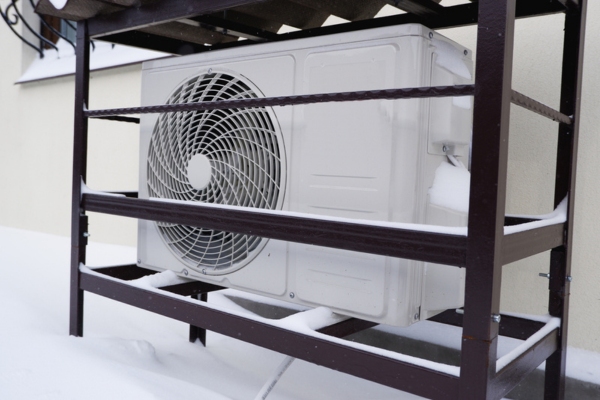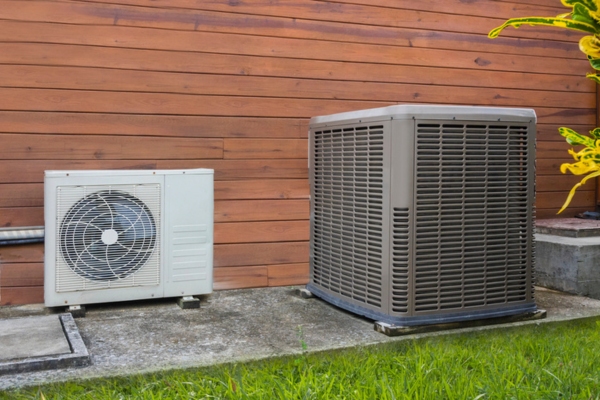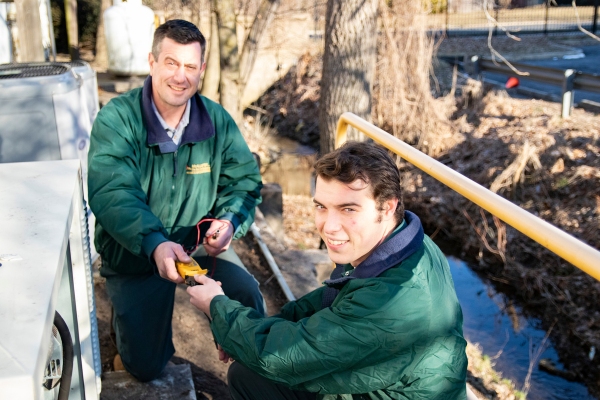Exploring HSPF: Your Complete Guide to Heat Pump Efficiency

Heat pumps are versatile and energy-efficient solution for heating and cooling homes. By extracting heat from the outside air—even in cold weather—and transferring it indoors, heat pumps offer a dual functionality that is effective and environmentally friendly. Central to evaluating a heat pump’s heating efficiency is the Heating Seasonal Performance Factor (HSPF), a metric that quantifies how well the system converts energy into heat during the heating season.
This article from McAllister Energy explores the significance of HSPF and demonstrates why it is an essential factor for homeowners to consider. Understanding this measure can empower homeowners to make knowledgeable choices about which heat pump to install, ensuring optimal energy efficiency and cost-effectiveness.
Understanding HSPF
Contents
- 1 Understanding HSPF
- 2 The Benefits of High Heat Pump HSPF Ratings
- 3 Choosing the Right Heat Pump
- 4 Maintenance Tips for Maximizing Heat Pump HSPF
- 5 Heat Pumps & HSPF FAQs
- 5.1 Can A Higher HSPF Rating Affect The Lifespan Of My Heat Pump?
- 5.2 What Are Some Uncommon Signs Of Inefficient HSPF Performance?
- 5.3 How Do Different Climate Zones Affect HSPF Requirements For Heat Pumps?
- 5.4 Are There Specific Maintenance Practices To Enhance HSPF During Peak Winter Months?
- 5.5 Can Upgrading Other Home Heating Components Improve My Heat Pump’s HSPF?
- 6 Conclusion
- 7 Contact McAllister Energy for Trusted HVAC Services
The HSPF is a rating used to express the efficiency of heat pumps. A higher HSPF rating indicates greater energy efficiency, meaning the system uses less electricity to produce more heat. This efficiency lowers energy bills and reduces the environmental impact by minimizing electricity consumption.
Comparison with Other HVAC Efficiency Ratings
HSPF is often compared to the Seasonal Energy Efficiency Ratio (SEER), which quantifies the cooling efficiency of heat pumps and air conditioners. SEER reflects the amount of cooling a system can provide per unit of electricity during the cooling season. On the other hand, HSPF focuses solely on heating efficiency.
Both metrics are crucial for understanding the overall energy performance of heat pumps, especially in climates that experience hot and cold seasons. Understanding these ratings helps homeowners balance their heating and cooling needs with energy consumption and cost considerations.
Schedule Your Free Consultation Today! Contact McAllister Energy to book a free consultation and learn the best heating and cooling solutions for your home. Call today!
HSPF Calculation
Calculating HSPF involves determining the total space heating requirements met by the heat pump over the heating season, measured in British Thermal Units (BTUs), and dividing it by the total electrical energy the heat pump consumes during that time, measured in watt-hours. The formula is straightforward:
Total Heating Output (BTUs) / Total Electric Energy Used (Watt-Hours) = HSPF
This calculation helps illustrate a heat pump’s efficiency in converting electricity into heating power, guiding consumers in choosing more energy-efficient systems.
The Benefits of High Heat Pump HSPF Ratings

High HSPF ratings on heat pumps signify more efficient energy use, which offers several significant advantages:
Energy Savings
A higher HSPF rating indicates a heat pump’s ability to use less electrical energy to produce more heat during the heating season. This efficiency translates into significantly reduced energy consumption, which lowers utility bills. Homeowners can enjoy consistent indoor comfort without the high costs typically associated with electric heating systems.
Achieve Efficient Operation: Optimize the performance of your HVAC systems with help from McAllister Energy. Call now!
Environmental Impact
High-efficiency heat pumps reduce the environmental footprint of home heating. By minimizing the electricity consumed, these units indirectly decrease the demand on power plants, which often rely on fossil fuels. This reduced energy usage results in lower carbon emissions, fostering a cleaner and more sustainable environment.
Long-Term Heat Pump Cost Benefits

The initial purchase and installation cost of a high-HSPF heat pump is generally higher than that of a less efficient model. However, the savings on energy bills can quickly recoup these costs. Additionally, many regions offer tax rebates and incentives for installing energy-efficient home heating systems, enhancing the financial returns over the unit’s lifespan. This makes high-HSPF heat pumps a more eco-friendly choice and a financially savvy one in the long run.
Book an Appointment with Our Experts! Call McAllister Energy to schedule an appointment with our knowledgeable team for all your HVAC needs. Call today!
Choosing the Right Heat Pump

Consider more than just the HSPF rating when selecting a heat pump. The Seasonal Energy Efficiency Ratio (SEER) is critical for measuring cooling efficiency and should align with your climate’s needs. The correct unit size is vital; too large or too small a heat pump can reduce efficiency and increase operational costs.
Additionally, the specific climate of your region can dictate the most appropriate type of heat pump. This ensures it operates effectively in either predominantly cold or warm temperatures.
Professional installation of a heat pump is essential. Proper installation makes sure that the system operates at its peak efficiency. An experienced technician can also optimize the performance according to your home’s requirements.
Incorrect installation can lead to frequent maintenance issues and shortened equipment life, negating the benefits of choosing a high-efficiency model. Therefore, investing in skilled installation is as crucial as selecting a suitable heat pump model.
Get in Touch for a Professional Assessment! Reach out to McAllister Energy to arrange a professional assessment of your air conditioner and heating system. Reach out now!
Maintenance Tips for Maximizing Heat Pump HSPF

Follow these straightforward maintenance steps to maintain your heat pump’s efficiency and maximize its HSPF rating:
- Regularly Replace or Clean HVAC Filters: Change or clean the air filters every one to three months to ensure optimal airflow and efficiency.
- Inspect Ducts & Vents: Check for and seal any leaks in ducts. Ensure vents aren’t blocked by furniture or curtains.
- Keep Outdoor Heat Pump Units Clear: Remove debris, leaves, or snow around the heat pump’s outdoor unit to prevent blockages and ensure adequate airflow.
- Check Heat Pump Refrigerant Levels: Low refrigerant levels can reduce the efficiency of your heat pump. Have a professional check these levels annually.
- Schedule Annual HVAC Inspections: Arrange for a professional technician to check and tune up your heat pump yearly to address any potential issues early.
McAllister Energy offers professional maintenance services to enhance your heat pump’s longevity and performance. Regular professional servicing ensures optimal efficiency and helps prevent unexpected breakdowns so your system runs smoothly year-round.
Consult with Our Specialists Now! Speak with the experts at McAllister Energy to get personalized advice on improving your home’s heating and cooling efficiency. Call today!
Heat Pumps & HSPF FAQs

Below are some common queries about heat pumps and the HSPF to help you better understand their efficiency and performance.
Can A Higher HSPF Rating Affect The Lifespan Of My Heat Pump?
A higher HSPF rating typically indicates that a heat pump operates more efficiently, which can result in reduced wear and tear on the system. Efficient operation means the heat pump doesn’t have to work as hard to produce the same amount of heat, potentially extending its lifespan. However, it’s still crucial to perform regular maintenance to ensure all components function correctly and avoid any long-term issues.
What Are Some Uncommon Signs Of Inefficient HSPF Performance?
Less obvious signs of declining HSPF performance can include uneven heating across different rooms, increased humidity levels within the home, and longer run times for the heat pump to reach the preferred temperature. If you notice any of these symptoms, it may indicate that your heat pump isn’t operating as efficiently as it should, and a professional inspection may be necessary.
How Do Different Climate Zones Affect HSPF Requirements For Heat Pumps?
HSPF requirements can vary significantly based on climate zones. Higher HSPF ratings are more critical in colder climates because the heat pump will need to work harder to maintain comfortable indoor temperatures. Conversely, the demand for the heat pump is less intense in milder climates. As a result, the HSPF rating, while still important, may not need to be as high. Choosing a heat pump with an HSPF rating that matches your specific climate needs is important to ensure optimal performance and efficiency.
Call Us Today to Optimize Your HVAC System! Contact McAllister Energy to ensure your heating and air conditioning system is running at its best with our comprehensive services. Call us now!
Are There Specific Maintenance Practices To Enhance HSPF During Peak Winter Months?
Yes, several maintenance practices can help maintain or even enhance your heat pump’s HSPF during the winter. These practices include regularly cleaning or replacing air filters, ensuring that outdoor units are free from snow and ice, and checking for any obstructions around the indoor and outdoor units. Additionally, scheduling a professional tune-up before the winter season can help ensure your system runs efficiently when you need it most.
Can Upgrading Other Home Heating Components Improve My Heat Pump’s HSPF?
Upgrading other components of your home heating system can significantly improve your heat pump’s HSPF. Enhancements such as better insulation, energy-efficient windows, and well-sealed ductwork reduce the overall heating load on your system. This means your heat pump can operate more efficiently, improving its HSPF and lowering your energy bills. Consulting with McAllister Energy for a comprehensive home energy audit can identify the best upgrades for your situation.
Conclusion
Understanding HSPF is crucial for choosing and maintaining an efficient heat pump. A higher HSPF rating signifies greater efficiency, translating into substantial energy savings and reduced environmental impact. Regular maintenance and professional installation are crucial to maximizing a heat pump’s performance and lifespan. Contact McAllister Energy for expert guidance on selecting and servicing high-efficiency heat pumps. They can help ensure optimal comfort, efficiency, and cost-effectiveness in your home heating and cooling solutions.
Quality Comfort Solutions: Rely on McAllister Energy for high-quality HVAC services that ensure comfort all year round. Contact us today!
Contact McAllister Energy for Trusted HVAC Services
At McAllister Energy, we provide top-tier heating and cooling services, staffed by certified technicians who excel in HVAC tune-ups, repairs, installations, and replacements. Our technicians are not only highly trained but also bring a wealth of knowledge and experience to ensure your HVAC system is serviced with precision.
We pride ourselves on offering the most competitive rates for heating and cooling services in Camden County, New Jersey. Our maintenance services are designed to enhance comfort and increase energy efficiency, ultimately reducing heating and cooling expenses. Whether you need a repair or a complete system replacement, McAllister Energy will guide you to the best solutions that fit your needs and budget. We stand behind our work with a robust satisfaction guarantee. Call McAllister Energy today to schedule your service appointment and receive a free, in-home estimate.
You can click here to contact us now or call us at (856) 665-4545 to find out more! Click the link to view our service area.

Related Articles: